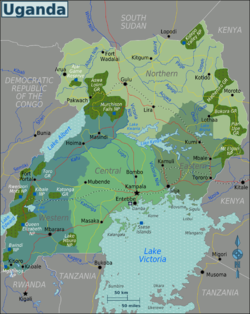Loading map...
{"minzoom":false,"maxzoom":false,"mappingservice":"leaflet","width":"auto","height":"250px","centre":{"text":"","title":"","link":"","lat":1.373333,"lon":32.290275,"icon":""},"title":"","label":"","icon":"","lines":[],"polygons":[],"circles":[],"rectangles":[],"copycoords":false,"static":false,"zoom":4,"defzoom":14,"layers":["OpenStreetMap"],"image layers":[],"overlays":[],"resizable":false,"fullscreen":false,"scrollwheelzoom":false,"cluster":false,"clustermaxzoom":20,"clusterzoomonclick":true,"clustermaxradius":80,"clusterspiderfy":true,"geojson":{"type":"FeatureCollection","features":[{"type":"Feature","geometry":{"coordinates":[[[33.976858673007655,4.226049844624839],[33.51104736328125,3.7546340909109253],[33.1787109375,3.7792999233736944],[33.0303955078125,3.8916575492899987],[32.8985595703125,3.817667600245491],[32.71728515625,3.768337417492072],[32.41790771484375,3.743671274749731],[32.196315038510136,3.5958900990663407],[32.2094924315156,3.591579721143775],[32.22015380859375,3.5617398360386128],[32.209586816455726,3.5496760571902053],[32.20199697245472,3.529414059703865],[32.20616943422123,3.5130048714176274],[32.20111650425801,3.5066408184654434],[32.089168036461615,3.5376856495050215],[32.082498356828296,3.5639395315922644],[32.05138642287619,3.5906510812045624],[32.03897812701223,3.5870285958913017],[31.957544640302615,3.587714239172424],[31.956588204264484,3.6086807426739735],[31.952656189438883,3.6232836378666207],[31.962220549824934,3.6473987157021845],[31.942012666930623,3.678364976543374],[31.82669069165692,3.8211101150357014],[31.791766911861913,3.827924000585703],[31.80078844456702,3.799345489420726],[31.73196753646289,3.7515016250103255],[31.70646306860678,3.717595033947506],[31.68284825200606,3.7137765744944087],[31.660436553436583,3.718962524156845],[31.527542621788598,3.6555703006411484],[31.495763203257667,3.676090229664409],[31.291877307420663,3.7933749180925322],[31.165466308593807,3.793002860841048],[31.09405517578125,3.7464119916730727],[31.06109619140625,3.738189815174382],[31.0308837890625,3.699818641574841],[30.98968505859375,3.699818641574841],[30.94573974609375,3.6669277409287235],[30.93475341796875,3.609365759510364],[30.90179443359375,3.581954006425634],[30.86229153269792,3.48187228929352],[30.878046318604405,3.4809694957866864],[30.882557907612693,3.4913980929388058],[30.904449509119047,3.504071951816162],[30.938348408283556,3.506722091626042],[30.943384039814188,3.465740551953689],[30.937066970485432,3.459346001561456],[30.938390908756958,3.399779035748377],[30.918658762457255,3.386720047962921],[30.918793235921157,3.3703920581294646],[30.8880615234375,3.337953961416485],[30.8930298047689,3.312727446788039],[30.887613282762857,3.313340770769596],[30.882831033982455,3.306019170732325],[30.874992382162816,3.302184786253377],[30.875906980740467,3.29200953283362],[30.866758441903215,3.283652577551653],[30.870927087741702,3.2774751716488932],[30.84346126742818,3.267107766159345],[30.836855280613953,3.2493724332511866],[30.841819962453755,3.23839395802296],[30.82836534466384,3.2197723535188914],[30.83062937108061,3.2018046582421897],[30.815537394518497,3.1739194446354606],[30.809908727102638,3.156212526547389],[30.80995623676329,3.1398135081426712],[30.80262856298532,3.133174332103318],[30.80008624420222,3.1005064059653646],[30.794230480250704,3.0925653435947984],[30.79536078039115,3.0666394702184006],[30.791219657107575,3.061440671504191],[30.775995646667965,3.057860253060328],[30.76863095833164,3.0501377613765035],[30.77970115415603,3.032387941700096],[30.77932654614282,3.022922921952624],[30.80469872026274,3.003436560333605],[30.81766051194151,3.0060810333553203],[30.8266949431768,2.998039989811711],[30.824500933154233,2.989113703393727],[30.83974055561149,2.9707446723173847],[30.85852600162174,2.9591626636546042],[30.853842496278766,2.9476547763070933],[30.86747907930376,2.9184411030366544],[30.889514256481334,2.876594226570162],[30.886286935340024,2.833661463182187],[30.884873242154185,2.811795689502291],[30.86666228866508,2.787333538416814],[30.83038330078125,2.7441590033642025],[30.772705078125,2.601492150469205],[30.74798583984375,2.5740543393115782],[30.75897216796875,2.505457240806713],[30.742492675781246,2.4670412895880314],[30.752105712890625,2.4217639236659676],[30.78231811523438,2.4341124474560316],[30.8331298828125,2.420391858508547],[30.88531494140625,2.329832525045374],[30.93338012695312,2.3394375828714224],[30.96221923828125,2.397066538982145],[30.995178222656246,2.4011828008347083],[31.07208251953125,2.342181873036884],[31.08306884765625,2.294156024546471],[31.133880615234375,2.2639675207386034],[31.1956787109375,2.294156024546471],[31.20254516601562,2.2214281090541332],[31.30691528320312,2.158302860179763],[31.30416870117187,2.1143880930418404],[30.555725097656246,1.272936040103872],[30.511779785156246,1.263325357489324],[30.482940673828125,1.2125254509324634],[30.390930175781246,1.185065642505663],[30.362091064453125,1.2001685712337191],[30.331878662109375,1.1521135135861749],[30.29205322265625,1.1658436142465605],[30.250854492187496,1.1479944704491494],[30.230255126953125,1.1177879741676244],[30.22613525390625,1.0724776497610704],[30.22476196289063,1.001078212534818],[30.17807006835938,0.9461545047333421],[30.16159057617187,0.9049611504960419],[30.135498046875,0.8884836766190173],[30.09567260742187,0.8884836766190173],[29.991302490234375,0.8417971060697861],[29.969329833984375,0.8074683870228081],[29.96658325195312,0.7580345254974181],[29.97344970703125,0.707226913459037],[29.95559692382813,0.6344474832839102],[29.978942871093746,0.5108574890167433],[29.875946044921875,0.39550467153201946],[29.81964111328125,0.1647946946615406],[29.77294921875,0.16204812380266767],[29.738616943359375,0.12496938333529391],[29.720764160156246,0.07141111432403538],[29.73312377929687,-0.019226073857941946],[29.74136352539063,-0.03021240094364597],[29.729003906249996,-0.07415769413887957],[29.64935302734375,-0.4641672859652214],[29.671325683593754,-0.48888566912309733],[29.671325683593754,-0.5534276733981742],[29.6795654296875,-0.5685331504706715],[29.652099609375,-0.5987439850125229],[29.656219482421875,-0.6330742762788482],[29.628753662109375,-0.7003609764007139],[29.63287353515625,-0.7909904981540058],[29.64248657226562,-0.8321850946692232],[29.627380371093746,-0.8720061292530121],[29.63150024414062,-0.9022149100110908],[29.587554931640625,-0.9035880305130805],[29.59442138671875,-0.9694971897227194],[29.58231658518727,-1.0201150539614472],[29.58980113812531,-1.052661394554336],[29.576637151163425,-1.1313964946592308],[29.584914789588012,-1.1561715202230354],[29.571668949978598,-1.1888194068887277],[29.607762383968492,-1.2209116834554348],[29.604464229063694,-1.2449831447953978],[29.59521649486655,-1.250860155814555],[29.591769962329547,-1.2713615394920073],[29.598877930020578,-1.3032092323736957],[29.605985897711605,-1.3172127720334974],[29.59091987725151,-1.387139268171262],[29.60274021406883,-1.3898056758176804],[29.61057307346644,-1.3941822346279746],[29.635318655554286,-1.3958899739089352],[29.642404046375596,-1.3916181772504497],[29.673345088391585,-1.3878004309556071],[29.687302359997485,-1.3690861689271683],[29.71138091020163,-1.3499340034133762],[29.730011627015017,-1.3435278513521163],[29.757866205213105,-1.3506215048312828],[29.772468754921388,-1.3683779986529157],[29.78334081622864,-1.3730225482312206],[29.792610008284896,-1.370528193234567],[29.795104869045616,-1.3545570799029114],[29.80332142750305,-1.3397069130917911],[29.817077629754735,-1.33414638317188],[29.817054546580263,-1.3093641203053217],[29.829277338025545,-1.3168705463779915],[29.836257642082302,-1.3258630649014307],[29.843353257556288,-1.3407594658786937],[29.859306119564877,-1.3640299942806096],[29.873290750993164,-1.3612614263334568],[29.877342001273504,-1.3650354788311063],[29.87824605666861,-1.3976766301327541],[29.88286391484371,-1.4082308409529152],[29.884597736537476,-1.4299972831035515],[29.89077765056622,-1.4367696838038306],[29.889747473386276,-1.4569966262144836],[29.914581187404934,-1.486832987276963],[29.92371313392617,-1.4859409452756558],[29.93516874990123,-1.4760448513034272],[29.99292917387888,-1.4555774195311544],[30.000000139280644,-1.4402473730422358],[30.015312313212036,-1.423132746434112],[30.022682210832844,-1.4230872223857673],[30.040740757877277,-1.43457321065673],[30.051223643459707,-1.4313697270780994],[30.051979016193886,-1.4064066355240963],[30.067336938637737,-1.394851587091603],[30.074111896692386,-1.3825643077684897],[30.083129367476797,-1.3790861349094832],[30.106338487048415,-1.3798870238626058],[30.117027136470824,-1.3888565416381622],[30.123172686887756,-1.3885824021603028],[30.125633079575408,-1.3745330703717686],[30.14495085973587,-1.356273106619999],[30.161274958407873,-1.3535141581489252],[30.16531321790825,-1.3462888862592253],[30.162037333960054,-1.3246192769106329],[30.169839086424528,-1.30622552831582],[30.17168338872059,-1.2767557681954245],[30.19319277835683,-1.281777691084014],[30.213486220568285,-1.2740361541973335],[30.262842153002055,-1.218083399542648],[30.272545478906864,-1.2143868618125653],[30.290018559118234,-1.1920131470555833],[30.293219643603376,-1.180044557861094],[30.305240322070002,-1.151534801865552],[30.332247257848692,-1.137489980321558],[30.342724155469085,-1.1265718463205232],[30.340134917028646,-1.0985324847694369],[30.35258584445694,-1.0812781595704322],[30.348151284227384,-1.0730937518225774],[30.35533242648819,-1.0604425477088189],[30.364812373499973,-1.0612446160528475],[30.37073578652408,-1.0642393360601847],[30.41422761606333,-1.0644956882350083],[30.434023754515923,-1.0579692938503364],[30.4395576808962,-1.0479859843619346],[30.451202181600692,-1.0480082110730609],[30.456458129599845,-1.051740115131183],[30.469318709190617,-1.0525600972698708],[30.472059025234103,-1.0576195303163016],[30.489120483398434,-1.0560010003542877],[30.511779785156246,-1.0724776497610577],[30.542678833007812,-1.0697315476496112],[30.556411743164062,-1.06286628163273],[30.585250854492188,-1.0580605863344144],[30.601043701171875,-1.0614932265948123],[30.642242431640625,-1.0608066988471778],[30.66421508789062,-1.0539414130094868],[30.673828125,-1.027853189647757],[30.696487426757816,-1.0127493836292623],[30.731506347656254,-1.0058839939265634],[30.75897216796875,-0.9846011944968368],[30.778884887695312,-0.9859742824625283],[30.798797607421875,-0.9969589657344465],[33.94046813320608,-1.0002108745245892],[33.94041102760082,-0.8774986531230247],[33.939273496212735,-0.7732415135126703],[33.94026761009857,-0.5365697673670728],[33.94173814755433,-0.4557126879325323],[33.982086181640625,-0.17715425874913565],[33.987579345703125,-0.12908924625577226],[33.90998840332031,0.1057433481738631],[34.006805419921875,0.24513169845733346],[34.02534484863281,0.25680456008937463],[34.02534484863281,0.2671041350464105],[34.043197631835824,0.2760304263727027],[34.04182434082031,0.2931963522129955],[34.04731750488281,0.29594289794519385],[34.05143737792969,0.3083023452333048],[34.05899047851551,0.3110488871471327],[34.05830383300781,0.32478158586859623],[34.069976806640625,0.32478158586859623],[34.09881591796875,0.3501870287272967],[34.103622436523324,0.36597956693034134],[34.111175537109375,0.37971218628714404],[34.08988952636719,0.43326918606630227],[34.08988952636719,0.4614207935306211],[34.11735534667969,0.4806462179537107],[34.11872863769531,0.5122307252991675],[34.12490844726551,0.5184102849172981],[34.116668701171875,0.5232166048991478],[34.1290283203125,0.5376355426179759],[34.13726806640625,0.5836385880254003],[34.17366027832031,0.6042368463810651],[34.189453125,0.6062966679651943],[34.19837951660145,0.6241484219169411],[34.20799255371094,0.6220886072127715],[34.22172546386719,0.6282680489024738],[34.235458374023324,0.6262082358143821],[34.24301147460926,0.6303278611785316],[34.256744384765625,0.6289546530848548],[34.25708770751953,0.632902625377631],[34.26584243774414,0.6368505946653173],[34.270477294921875,0.638738752822111],[34.27236557006836,0.6371938961998853],[34.27253723144531,0.6406269102852002],[34.27476882934559,0.6394253556163325],[34.277343749999886,0.6414851634476288],[34.27991867065418,0.6468063298344634],[34.27957534790039,0.6538439929309058],[34.27717208862305,0.6564187452630884],[34.28077697753906,0.6567620454739986],[34.278202056884766,0.6600233962998857],[34.28112030029297,0.6632847449871807],[34.28129196166992,0.6653445430514643],[34.277687072753906,0.6742703246919985],[34.27906036376953,0.6801064038533177],[34.282836914062386,0.6818228963840709],[34.28781509399403,0.6804497024083547],[34.29107666015625,0.6833677391385439],[34.294166564941406,0.6859424759580927],[34.29605484008789,0.6843976340322561],[34.29502487182617,0.6881739134146799],[34.29828643798817,0.6886888603719342],[34.29948806762695,0.6909202965432975],[34.30377960205067,0.6907486476442014],[34.309101104736214,0.6946965707517095],[34.31201934814453,0.694353273220862],[34.31373596191406,0.7005326249501653],[34.309959411621094,0.7049954850243348],[34.31013107299805,0.7125480076987035],[34.30652618408203,0.7190706309582398],[34.309444427490234,0.7254215972830975],[34.30824279785156,0.7298844331565028],[34.31081771850586,0.749452199348631],[34.314422607421875,0.7607808662819371],[34.32146072387695,0.7654153123887659],[34.37347412109375,0.7800052024755708],[34.391326904296875,0.7992294508519651],[34.4146728515625,0.8060952321492764],[34.405059814453125,0.8294388013837057],[34.44488525390625,0.8651404631516638],[34.454498291015625,0.9022149100111034],[34.479217529296875,0.9379158723334092],[34.4915771484375,1.046389581112665],[34.523162841796875,1.1081767506977553],[34.575347900390625,1.0971924571309455],[34.583587646484375,1.1466214547504312],[34.649505615234375,1.1740816425535396],[34.671478271484375,1.205660524693437],[34.784088134765625,1.22350929666262],[34.817047119140625,1.2441038858778743],[34.828033447265625,1.2743089918452106],[34.828033447265625,1.3058866783157643],[34.786834716796875,1.3649221509479303],[34.8046875,1.3827698020869972],[34.797821044921875,1.4198375698213372],[34.839019775390625,1.4541590473507433],[34.86785888671875,1.533782844433069],[34.899444580078125,1.5530019436002598],[34.9420166015625,1.5763391859789333],[34.99420166015625,1.6628219493266643],[35.00244140625,1.7987157028424698],[35.001068115234375,1.9606767908079445],[34.984588623046875,1.9826364384297503],[34.970855712890625,2.1102710195104373],[34.910430908203125,2.408043209688525],[34.957122802734375,2.4629252286881287],[34.93377685546875,2.513689084314129],[34.9090576171875,2.5219208759013174],[34.893951416015625,2.594632753402095],[34.87472534179676,2.5754262439509716],[34.847259521484375,2.589145208949906],[34.775848388671875,2.6947762053677313],[34.78546142578125,2.753760978329042],[34.753875732421875,2.8292023527861603],[34.704437255859375,2.874464829653609],[34.68246459960926,2.8662354211137324],[34.646759033203125,2.8703501327916534],[34.63714599609375,2.9101249120129142],[34.600067138671875,2.9210970187084637],[34.57672119140625,3.03492622519611],[34.57672119140625,3.091150714460597],[34.53826904296875,3.1418873316617297],[34.49981689453125,3.1460010038859347],[34.470977783203125,3.1706826955909406],[34.457244873046875,3.180280972447857],[34.43748507489488,3.3037571700945287],[34.397863530875526,3.369054533746354],[34.39384560554555,3.414191985849563],[34.41741943359375,3.4393997974141586],[34.38290877846612,3.4888191647244775],[34.4256591796875,3.4928601714481537],[34.44102098082956,3.513349832536142],[34.447275076464535,3.581947636438088],[34.450253785109794,3.6738215706313277],[34.39482854956054,3.694817229628022],[34.367035777382625,3.7321684586242756],[34.312187225332025,3.728451444375313],[34.299607682167675,3.679273708574304],[34.29665314574763,3.7088464000494468],[34.234521996884496,3.77966176480639],[34.158521335371375,3.7674357350709724],[34.18129059914048,3.7915969802644356],[34.14367073416858,3.79931443188424],[34.16936495970697,3.8296022856902905],[34.21501051508699,3.8318029385364927],[34.20608118931594,3.8784247731296264],[34.166107177734375,3.873845743492074],[34.078365124862614,3.8584891656009743],[34.07923308427698,3.883258779573691],[34.10854185125993,3.899302903490897],[34.12281576896521,3.958393603293281],[34.05190996775406,4.008038809294879],[34.047861446601246,4.025343647047401],[34.08215804604532,4.039042577981817],[34.076195226328025,4.075524432898018],[34.04121491554554,4.121260973202016],[34.05721888374049,4.140371737663628],[34.01674540889553,4.198436890973587],[33.976858673007655,4.226049844624839]]],"type":"Polygon"},"properties":[]}]},"clicktarget":"https://digitalbahairesources.org/map?lat=1.373333\u0026lon=32.290275\u0026zoom=4","GeoJsonSource":"UG","GeoJsonRevisionId":159304,"imageLayers":[],"locations":[],"imageoverlays":null}

